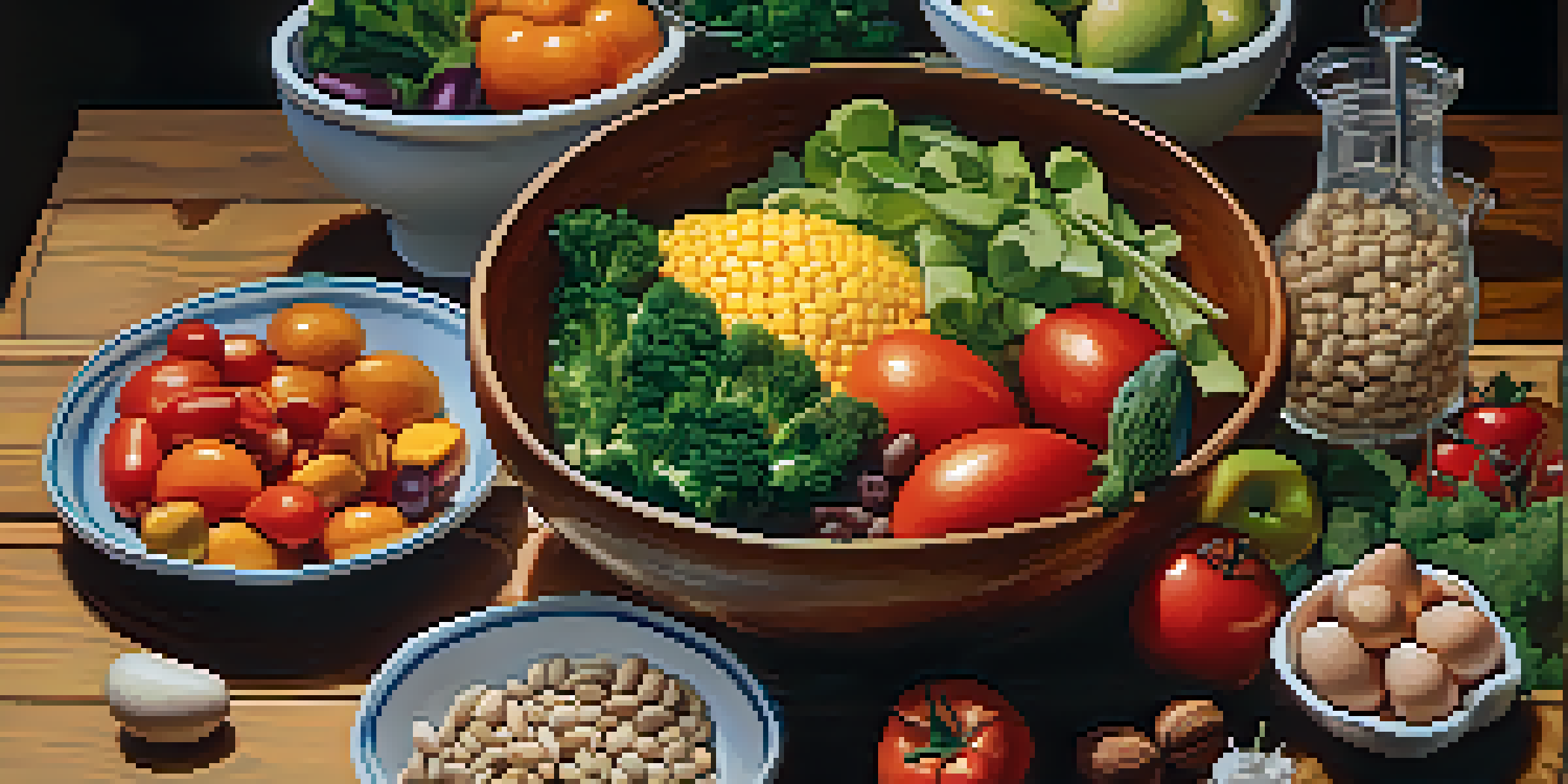Can You Build Muscle Without Supplements? The Real Facts

Understanding Muscle Growth: The Basics
Muscle growth, or hypertrophy, occurs when muscle fibers sustain damage during exercise and then repair, getting bigger and stronger. This process relies heavily on your workout routine and nutritional habits. Essentially, when you lift weights or engage in resistance training, you create small tears in your muscles, which then heal and grow back stronger.
The only bad workout is the one that didn't happen.
To maximize muscle growth, you need to follow a structured exercise plan that includes progressive overload—gradually increasing weights and intensity. This signals your body to adapt and grow. Without this stimulus, your muscles may not respond as effectively, regardless of your diet or supplementation.
Nutrition plays a crucial role in supporting this muscle-building process. A balanced diet with adequate protein, carbohydrates, and fats provides the necessary building blocks for muscle repair and energy. Essentially, what you eat can significantly impact your results, making it possible to build muscle without supplements.
The Role of Protein in Muscle Building
Protein is often seen as the holy grail for muscle building, and for good reason. It provides the amino acids your body needs to repair and grow muscle tissues. While many turn to protein powders for a quick fix, you can effectively meet your protein needs through whole foods like chicken, fish, beans, and legumes.

Aiming for a protein intake of about 1.6 to 2.2 grams per kilogram of body weight can support muscle growth while training. This means that if you weigh 70 kg, you should consume between 112 to 154 grams of protein daily. You can achieve this through meals rich in high-quality protein sources without ever needing to reach for a supplement.
Muscle Growth Requires Consistency
Establishing a consistent strength training routine is essential for stimulating muscle growth effectively.
Additionally, spreading your protein intake throughout the day can enhance muscle protein synthesis. Instead of consuming a large amount in one meal, try to include protein in each meal and snack. This balanced approach can help keep your muscles fueled and ready to grow.
Strength Training: The Key Component
Engaging in strength training is essential for building muscle, and you don't need fancy equipment to get started. Bodyweight exercises like push-ups, squats, and lunges can be incredibly effective at stimulating muscle growth. Even everyday activities like carrying groceries can contribute to your strength training regime.
What you eat in private, you wear in public.
It’s important to challenge your muscles regularly. This means progressively increasing the weight or resistance you use in your workouts or trying new exercises that target different muscle groups. This challenge encourages your body to adapt and grow stronger over time.
Consistency is crucial in your training regimen. Establishing a routine that includes strength training at least two to three times a week will yield better results compared to sporadic workouts. The more consistent you are, the more your body will respond with muscle growth.
Natural Foods: Your Best Allies
When it comes to building muscle, whole, natural foods should be your go-to. Foods like lean meats, eggs, dairy, nuts, and grains provide not just protein but also essential vitamins and minerals that support overall health. These nutrients play key roles in recovery and muscle development.
Incorporating a variety of fruits and vegetables into your diet can also aid muscle growth. They are packed with antioxidants, which help reduce inflammation and muscle soreness after workouts. This means you can train harder and recover faster without the need for additional supplements.
Nutrition Fuels Muscle Development
A balanced diet rich in protein, carbohydrates, and healthy fats is crucial for supporting muscle repair and growth.
Moreover, carbohydrates are just as important in your diet. They provide the energy needed for intense workouts, enabling you to push harder and lift heavier. This energy source is crucial for fueling your workouts and ensuring your muscles have what they need to grow.
Rest and Recovery: Don't Neglect It
Many people overlook the importance of rest when it comes to building muscle. However, adequate recovery time is essential for your muscles to heal and grow. When you work out, you’re actually causing tiny tears in your muscle fibers, and they need time to repair, which happens during rest periods.
Aim for at least 7-9 hours of quality sleep each night. Sleep is when your body goes into recovery mode, releasing growth hormones that contribute to muscle repair and growth. Without enough sleep, your body may not recover effectively, which can hinder your muscle-building efforts.
Additionally, incorporating rest days into your training schedule is vital. This doesn’t necessarily mean being inactive; you can engage in light activities like walking or yoga to promote blood flow and recovery while still allowing your muscles to recuperate.
Hydration: A Key Player in Muscle Building
Staying hydrated is often underestimated in the muscle-building process. Water is crucial for various bodily functions, including nutrient transport and temperature regulation during workouts. Dehydration can lead to fatigue, making it harder to perform at your best during training sessions.
Aim to drink plenty of water throughout the day, especially before, during, and after workouts. A good rule of thumb is to consume at least half your body weight in ounces of water daily. For instance, if you weigh 150 pounds, aim for 75 ounces of water each day.
Rest Is Key for Recovery
Adequate rest and recovery, including quality sleep and rest days, are vital for allowing muscles to heal and grow stronger.
Additionally, you can include hydrating foods like fruits and vegetables in your diet. Foods such as cucumbers, oranges, and watermelon can help keep your hydration levels up while providing essential nutrients for muscle recovery.
Final Thoughts: Building Muscle Naturally
In conclusion, building muscle without supplements is not only possible but can also be effective. By focusing on a balanced diet, consistent strength training, and proper recovery, you can achieve your fitness goals naturally. Remember that supplements are not a magic solution and should not replace whole foods.
Instead, prioritize nutrient-dense foods and stay committed to your workout routine. Over time, your body will respond positively, leading to the muscle growth you desire. It’s about making sustainable lifestyle choices that support your overall health and fitness.

Ultimately, the journey to building muscle is as much about patience and dedication as it is about the right nutrition and training. Embrace the process, and you might be surprised by what your body can achieve without relying on supplements.